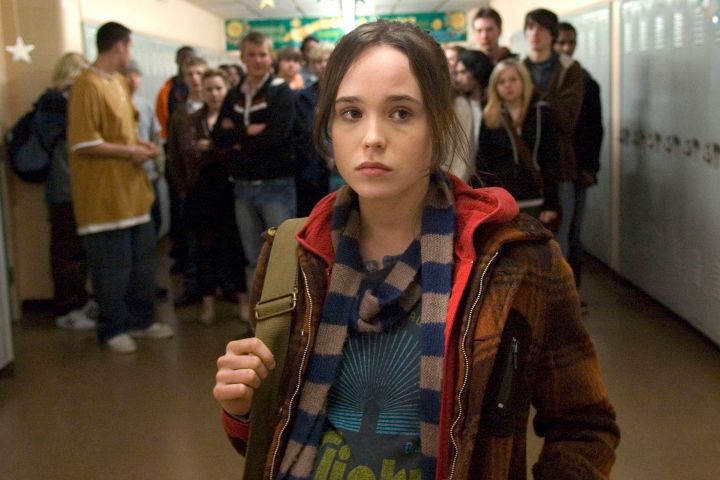
The coming-of-age comedy deserves celebration–and not just because of its killer script.
Ten years ago today, the Writers Guild of America strike was just beginning, along with the great recession. Earlier in the year, President Bush announced a surge of troops to be sent to Iraq, the last Harry Potter book was published, and the first iPhone made its debut. From the hindsight of present-day America, 2007 feels like a completely different century. And then there was Juno.
Written by then-first-time screenwriter Diablo Cody, directed by Jason Reitman (fresh off of Thank You For Smoking), and starring Elliot Page, Juno screened at Telluride and Toronto before opening in limited release on December 5th. The film went on to win the Oscar for Best Screenplay and make over $200 million worldwide. Upon its release and in the years since, Juno has come to signify something vastly different depending on who you ask: it’s a vital testament to unique, intelligent young women, or it’s a comedy with an anti-abortion message that treats pregnancy like a joke. It’s “indie” and “quirky” in the worst way, or it’s proof that good independent films can become blockbusters.
Before any of the La La Land-style backlash and vilification of “quirkiness” on screen, Roger Ebert, as he so often did, had the best take:
“I don’t know when I’ve heard a standing ovation so long, loud and warm as the one after Jason Reitman’s Juno…It’s the kind of movie you almost insult by describing the plot, because the plot sounds standard and this is a fresh, quirky, unusually intelligent comedy…[everyone] is completely unlike any version of those characters I have ever seen before.”
It’s true. Juno MacGuff was different from the first moment we saw her, chugging Sunny D in an extended, colorful rotoscope sequence set to Barry Polisar’s “All I Want Is You” before demanding a pregnancy test and some licorice rope from a gas station attendant. Cody’s keen script imagines Juno as a clever, pop culturally savvy, fast-talking girl who deals with her unplanned pregnancy with a mix of sardonic humor and feigned casualness. Elliot Page brings the character to life in all her idiosyncratic glory, pulling together scenes that blend humor and heart with a simple softening of his features or a vocal inflection that suggests tentative vulnerability.
Juno’s screenplay and soundtrack are its most-discussed features, but the cultural urge to diminish the film to a series of quippy exchanges and kooky songs–especially as it ages into a bullet point in film history–reveals a fundamental misunderstanding of the story itself. Juno loves Dario Argento movies and The Runaways, has freaky drawings and collages of magazine clippings on her bedroom wall and talks to her best friend Leah (Olivia Thirlby) in proto-meme culture oddball slang. These details aren’t just window dressing meant to make the movie seem cool and different–for Diablo Cody and many other young women, they’re personal and real and rarely portrayed on screen. Despite what some criticized as “hyper-stylized” dialogue, in 2007, Juno MacGuff felt fully realized in a way that few other female teens on film had before. For viewers (including myself) who saw Juno when they were teenagers, Page’s character became a kind of patron saint, a reassurance to any girl who had never been told that her strong personality or enthusiastic curiosity or disinterest in the status quo was okay.
Underneath all the comedy and funkiness, Juno was and is also one hell of a coming-of-age story. Our self-possessed protagonist is at many points nonplussed by her pregnancy–the event that we’d expect to be the driving force behind her character development–and is instead focused on making it through high school and romance drama with the baby’s dad, Paulie Bleeker (Michael Cera). Her true push into adulthood comes late in the film, when Mark Loring, the baby’s potential adoptive father (Jason Bateman in an underrated performance), implies that he has feelings for Juno and plans to leave his wife Vanessa (Jennifer Garner) for her. Juno is blindsided by this revelation–like kids do, she thought Mark was just a cool older friend who liked the same stuff she did. After leaving the Lorings and their quickly crumbling marriage, she pulls over on the side of the freeway to cry.
It’s what people call ugly crying, the uncomfortable, uncontrolled kind where you worry you might start hyperventilating, and Juno’s doing it inside a minivan in the dead of winter while heavily pregnant. There’s no cute musical cue or dialogue, and the scene only lasts about a minute. This moment is not what people talk about when they talk about Juno, but it’s tremendously powerful. It’s a moment of painfully forced growth that hurts to watch, as our hero finally understands that the world around her is so much darker and more complex and adult than she had thought. Fighting off disappointment, shock, and likely frustration at her own naivety, Juno gives herself a moment of grief for the spiritual end of her childhood before regaining her composure. She returns later to the Loring house to leave a note letting Vanessa know she’s still committed to the adoption, and when her dad (JK Simmons) asks what she’s been up to that day, her answer is honest and a little bit heartbreaking: “Oh, just out dealing with things way beyond my maturity level.”
Juno is neither the first nor the last deeply felt film about a self-possessed, vibrant young woman to be beloved by some and mocked by others. Already, there has been a similar, if more minor backlash against Greta Gerwig’s Lady Bird, another coming-of-age film that feels personal and relatable to many women. Neither film is perfect–criticism of their lack of diversity is certainly warranted–but both have been dismissed by critical voices as overrated without regard for their specific power. Juno and other films like it manage to pull something previously unseen, unrepresented out of the hearts and minds of girls everywhere and put it on a screen 25 feet high for the world to celebrate. If that isn’t movie magic, I don’t know what is.
Related Topics: diablo cody, ellen page, jason bateman, jason reitman, juno

